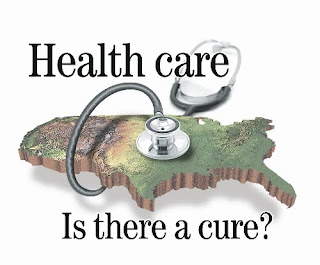
If you read one thing on the health care reform debate, read Jeffrey Gordon's post at KevinMD on the economics of health care. He outlines in succinct form the dilemma of delivering a complex but necessary product to a population that varies in it's ability to understand and pay for this product.
In economics, a public good is a good that is non-rivaled and non-excludable. This means, respectively, that consumption of the good by one individual does not reduce availability of the good for consumption by others; and that no one can be effectively excluded from using the good.[1] In the real world, there may be no such thing as an absolutely non-rivaled and non-excludable good; but economists think that some goods approximate the concept closely enough for the analysis to be economically useful.
By definition “public goods” are not well distributed by market mechanisms. Americans are very accepting of some public goods, i.e. police and fire departments, national military forces, the GPS system, water distribution and sewage treatment plants, education, radio frequencies and the internet. Looked at from an economic and a public policy perspective, health services are the epitome of a “public good.” This is what is meant by the phrase “Health Care is A Human Right!” Hospitals, ambulance systems, mosquito control, TB control, restaurant inspections, sanitation, and vaccines are all good examples.
When a person gets sick he or she functions poorly as a consumer. Often there is no opportunity to investigate or shop around for quality, never mind price. A seriously ill person has no price sensitivity - care is needed now and many patients will face even bankruptcy to get needed care in spite of looming bills. Even the most intelligent and computer literate sick patients are often seriously deficient in relevant knowledge both of disease states and who is well qualified to treat them.
Under our insurance system, the patient is rarely the consumer. Most purchasing decisions are made by a doctor acting as the patient’s surrogate. While one can discover a price for one item or service, it is totally impossible to have any sense of the ultimate charges for any significant package of medical services, so it is impossible to price shop even when there is time.
Can we shop for electricity suppliers? or water and sewage providers? or schools? Actually, we can. People choose to upgrade their water all the time, and go to private schools, and we also buy batteries and generators for portable electric power. Under any health care reform proposal, people would be allowed to purchase more insurance as they saw fit, and they could pay for premium care if they perceived added value. None of this would change under any proposed reform bill, but safe and affordable electricity, water and public schools are considered necessary for a civilized society, and so should health care.
Read the whole thing to see what his conclusion is. Hint: the town hall screamers' teabags would explode.

No comments:
Post a Comment